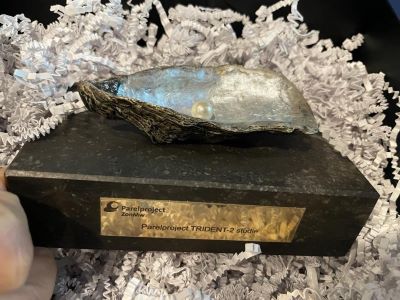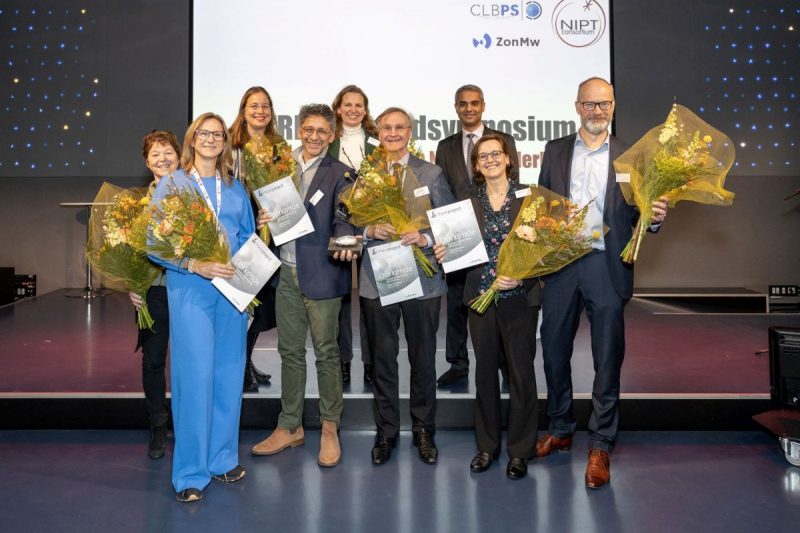Recognizing Outstanding Accomplishments
ZonMw Pearl Award for the TRIDENT-2 Study
The ZonMw Pearl Award recognizes the groundbreaking TRIDENT-2 study, the successful pilot implementation of non-invasive prenatal testing (NIPT) in the Netherlands. By thoroughly examining all aspects of implementing NIPT responsibly, the study paved the way for its integration into the national prenatal screening program, marking a transformative milestone in prenatal care.

In 2023, the TRIDENT-2 study, led by the Dutch NIPT Consortium, was honored with the prestigious ZonMw Pearl Award. This award acknowledged the study’s significant societal and scientific contributions, made possible by the remarkable collaboration between all relevant parties, including many employees of the Department of Human Genetics at Amsterdam UMC.
Professor Erik Sistermans, project leader and head of the section Genome Analysis, and Professor Lidewij Henneman, head of the section Community Genetics, together with other members of the Consortium’s core group, accepted the Pearl on January 26, 2023, marking a moment of recognition of the outstanding accomplishments by the NIPT consortium.

“I’m very proud of what the NIPT Consortium has achieved,” says Prof. Erik Sistermans. “The test works well and is appreciated by those choosing to have it. Also, as its use becomes more widespread, other countries are looking at us as an example of how to implement NIPT.”
Research in TRIDENT-2
Collaborative excellence
Authorized by the Minister of Health, Welfare and Sport (VWS) in 2016, the TRIDENT-2 study has facilitated the screening of over half a million pregnant women within six years, revolutionizing prenatal screening in the Netherlands.
It’s success is due to the close collaboration among a diverse array of professionals from eight Dutch academic centers, including obstetricians, gynecologists, laboratory specialists, clinical geneticists, and researchers, working in tandem with organizations such as Erfocentrum, the Patient Alliance for Rare and Genetic Diseases (VSOP), governmental bodies like VWS, and the RIVM Center for Population Screening, as well as the funding party ZonMw.
TRIDENT stands for TRIal by Dutch Laboratories for Evaluation of Non-invasive Testing. NIPT involves screening for the fetal chromosomal disorders – Down, Edwards or Patau syndrome – by analyzing a sample of blood from the expectant mother.
The study examined how NIPT could be offered in the best possible way. Every aspect, from education and counseling for expectant parents to setting up the laboratory testing and subsequent outcomes, was thoroughly explored.
To ensure responsible implementation, researchers from the Department of Human Genetics, including Dr. Karuna van der Meij, also investigated the personal decision-making process surrounding NIPT, highlighting the importance of informed choice for pregnant women and their partners.
“We found that women had the relevant knowledge they needed to make an informed choice to accept or decline the test, one aligned with their values and circumstances.”
Dr. Karuna van der Meij, postdoctoral researcher at the section Community Genetics
The TRIDENT-2 study’s conclusions succeeded in laying the groundwork for the national implementation of the test, including provisions for financial reimbursement, effective as of April 1, 2023.
Looking Ahead
The journey of NIPT from a careful pilot to a fully integrated component of prenatal screening exemplifies innovation driven by collaboration. The Department of Human Genetics at Amsterdam UMC continues to lead the way in evaluating the implementation of innovative genetic developments in society, with a focus on ethical considerations and patient autonomy.
“As we move forward, we need to make sure that genetic advancements like NIPT not only enhance our medical screening capabilities, but also uphold the principles of autonomy and informed choice.”
Prof. Lidewij Henneman, head of the section Community Genetics
Website: www.niptconsortium.nl